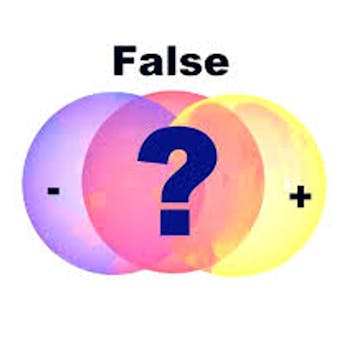
Data has the power to inform decision-making to move us toward our personal, professional, and organizational goals. However, there is a risk involved in data-driven decision making when we are not confident in the interpretation of analytical test findings. Gaining that confidence in the data we use for decision-making requires us to be able to recognize Type 1 and Type 2 analysis errors. In this project you will gain hands-on experience with the principles of developing a hypothesis, conducting a t-test, interpreting test results, and recognizing Type 1 and Type 2 errors. To do this you will work in the free-to-use spreadsheet...
Read more
Good to know
Save this course
Reviews summary
Simple and easy to learn data analysis
Activities
Review descriptive statistics
Show steps
Sharpen your understanding of descriptive statistics, which will be essential for understanding analytical test findings.
Browse courses on
Descriptive Statistics
Show steps
-
Review your notes and textbook chapters on descriptive statistics.
-
Take practice quizzes or exams to test your understanding.
Conduct t-tests with Google Sheets
Show steps
Gain practical experience with conducting t-tests using Google Sheets, which will enhance your confidence in interpreting test results.
Browse courses on
t-Test
Show steps
-
Create a dataset in Google Sheets that includes variables relevant to your research question.
-
Use the TTEST function to perform a t-test on your dataset.
-
Interpret the test results and draw conclusions based on the p-value.
Write a report on your t-test findings
Show steps
Contribute to your own learning by documenting your t-test findings in a report, which will solidify your understanding and strengthen your ability to communicate data-driven insights.
Show steps
-
Summarize the research question and hypothesis you tested.
-
Describe the dataset you used and the t-test procedure you followed.
-
Present the test results, including the p-value and your interpretation.
-
Discuss the implications and limitations of your findings.
One other activity
Expand to see all activities and additional details
Show all four activities
Design a study to test a hypothesis
Show steps
Solidify your understanding of hypothesis testing by designing a study that involves collecting and analyzing data to test a hypothesis, which will enhance your ability to make data-driven decisions.
Browse courses on
Hypothesis Testing
Show steps
-
Identify a research question and formulate a hypothesis.
-
Determine the appropriate data collection method and sample size.
-
Collect and clean the data.
-
Analyze the data and interpret the results.
-
Draw conclusions and discuss the implications of your findings.
Review descriptive statistics
Show steps
Sharpen your understanding of descriptive statistics, which will be essential for understanding analytical test findings.
Browse courses on
Descriptive Statistics
Show steps
- Review your notes and textbook chapters on descriptive statistics.
- Take practice quizzes or exams to test your understanding.
Conduct t-tests with Google Sheets
Show steps
Gain practical experience with conducting t-tests using Google Sheets, which will enhance your confidence in interpreting test results.
Browse courses on
t-Test
Show steps
- Create a dataset in Google Sheets that includes variables relevant to your research question.
- Use the TTEST function to perform a t-test on your dataset.
- Interpret the test results and draw conclusions based on the p-value.
Write a report on your t-test findings
Show steps
Contribute to your own learning by documenting your t-test findings in a report, which will solidify your understanding and strengthen your ability to communicate data-driven insights.
Show steps
- Summarize the research question and hypothesis you tested.
- Describe the dataset you used and the t-test procedure you followed.
- Present the test results, including the p-value and your interpretation.
- Discuss the implications and limitations of your findings.
Design a study to test a hypothesis
Show steps
Solidify your understanding of hypothesis testing by designing a study that involves collecting and analyzing data to test a hypothesis, which will enhance your ability to make data-driven decisions.
Browse courses on
Hypothesis Testing
Show steps
- Identify a research question and formulate a hypothesis.
- Determine the appropriate data collection method and sample size.
- Collect and clean the data.
- Analyze the data and interpret the results.
- Draw conclusions and discuss the implications of your findings.
Career center
Data Analyst
Financial Analyst
Market Researcher
Operations Research Analyst
Statistician
Data Scientist
Business Analyst
Management Consultant
Product Manager
Marketing Manager
Sales Manager
Customer Success Manager
Operations Manager
Project Manager
Human Resources Manager
Reading list
Share
Similar courses
OpenCourser helps millions of learners each year. People visit us to learn workspace skills, ace their exams, and nurture their curiosity.
Our extensive catalog contains over 50,000 courses and twice as many books. Browse by search, by topic, or even by career interests. We'll match you to the right resources quickly.
Find this site helpful? Tell a friend about us.
We're supported by our community of learners. When you purchase or subscribe to courses and programs or purchase books, we may earn a commission from our partners.
Your purchases help us maintain our catalog and keep our servers humming without ads.
Thank you for supporting OpenCourser.



